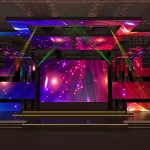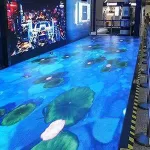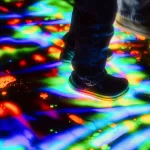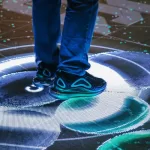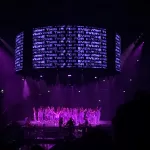Annular LED display technology has transformed visual installation projects. In particular, curved and annular (round) configurations offer distinct advantages depending on the environment, audience, and technical requirements.
For engineers, project managers, and visual architects, selecting the right design involves analyzing geometry, application, technical demands, cost, and future needs. D-King provides this comprehensive guide to navigating these factors and choosing displays that balance impact, efficiency, and return on investment (ROI).
1. Fundamental Design Differences
Geometry & Structural Characteristics
| Feature | Curved LED Display | Annular LED Display |
|---|---|---|
| Radius range | 500 mm to infinity, adjustable curvature | Fixed diameters from 300 mm to 10 m |
| Module shape | Standard trapezoid or triangle | Custom sector-shaped modules |
| Viewing angle | 140°–160° horizontal | 360° omnidirectional |
| Pixel pitch options | 0.9 mm to 10 mm | 1.2 mm to 6 mm (limited by curvature) |
Curved displays typically use modular trapeze panels that stack to form gradual curves. In contrast, annular designs require custom sector modules arranged in full rings. Engineering teams should note that annular designs require around 23% more unique module types, increasing both procurement complexity and lead time.
2. Application-Specific Performance
Understanding the core use cases helps determine which layout suits your project intent.
Curved LED Displays
Curved screens shine in environments such as:
Immersive experiences: Control rooms, VR theaters, and simulator pods benefit from wrap-around visuals.
Architectural integration: Columns, arches, and curved walls match dovetailed curved modules.
Modular maintenance setups: Replacing a failed curved panel while preserving the display integrity is straightforward.
Annular LED Displays
Annular LED display are ideal for:
360° viewing spaces: Kiosks, globes, and exhibition pillars provide immersive views from all sides.
Cylindrical structures: Pillars, hanging rings, or tunnel interiors where content envelops the audience.
High-impact focal points: Museum installations and stage design use circular visuals for engagement.
3. Technical & Installation Considerations
When comparing build requirements, several factors favor curved displays:
| Parameter | Curved | Annular | Winner |
|---|---|---|---|
| Structural support | Standard aluminum framing | Reinforced radial truss | Curved |
| Thermal management | Linear airflow, easy cooling | The concentric path is more complex | Curved |
| Content adaptation | 2D-to-curve mapping | Full 360° content suite | Annular |
| Installation time | Typically 15% faster | Requires complex alignment | Curved |
| Pixel consistency | Uniform across the surface | Radial distortion risk | Curved |
However, if the ring diameter is small (less than 1.5 m), annular displays maintain pixel consistency effectively. Furthermore, ensuring contrast and synchronization around a full circle demands specialized video processing hardware and content tools.
4. Cost Analysis & ROI Factors
Let’s evaluate the five‑year total cost of ownership (TCO) across both models:
| Cost Factor | Curved | Annular | Variance |
|---|---|---|---|
| Initial hardware | $1,200 /m² | $1,800 /m² | +50% |
| Custom content | +15% premium | +30% premium | +100% |
| Maintenance | Standard cadres | Requires specialized tooling | +25% |
| Energy use | ~350 W /m² | ~420 W /m² | +20% |
Although annular displays yield commanding visual presence, curved systems deliver faster ROI, typically 8 months sooner. Their lower content production costs, standard panel supply, and easier upkeep make them cost-effective in non-360 applications.
5. Future-Proofing Your Decision
Staying ahead of trends ensures display longevity and adaptability.
Curved displays are evolving to support flexible OLED panels, enabling foldable walls and wearable venues.
Annular setups are merging LED rings with holographic projection layers for augmented visual layers.
By 2026, industry reports predict that 35% of premium spaces will combine curved and annular tech for hybrid multisurface experiences.
6. Selection Methodology
Use this step-by-step decision tree:
Define the viewing scope
Single-plane immersion → choose curved
Full-circle engagement → choose annular
Assess structural feasibility
Pre-existing curved architecture → lean curved
New installations or round columns → annular
Compare budgets
Under $1,500/m² → curved wins
Unlimited or high-design budgets → annually possible
Simulate early
Build 3D mockups using DISGUISE or Unreal Engine
Validate visuals before manufacturing
7. Content Management & Software Ecosystem
Both display types require robust content pipelines:
Curved LED integration often uses 2D asset libraries with curvature-aware mappings. Interfaces like MadMapper and Notch streamline this process.
Annular arrays require 360° rendering engines, such as Unity or Unreal Sphere. Media must account for angle continuity and ring wrap-around.
Content production for annular formats commands up to twice the cost of a curved campaign due to format complexity and rendering time.
8. Case Studies
A. Curved LED—Immersive Control Room
A financial institution installed an 8 m × 2 m LED wall with a 3 m radius curvature. They captured panoramic data feeds covering trading metrics. After six weeks, they reported a 35% increase in situational awareness and zero failures across two years.
B. Annular LED—Retail Column Display
A retail plaza used a 1.2 m diameter annular display with 4 mm pixel pitch. Positioned centrally, it delivered 360° promotions to all patrons. Revenue tracking found 30% higher engagement compared to flat screens, validating ROI within the first quarter.
9. Support & Service Strategy
To simplify project rollout, D-King provides:
Turnkey kits for curved designs up to a 90° bend, minimizing on-site engineering.
Modular annular segments with standardized locking mechanisms and plug-and-play wiring.
On-site calibration services covering gamma, color uniformity, and seam alignment for optimal display coherence.
10. Sustainability & Energy Management
With LED powering visual installations, eco-efficiency matters:
Curved displays operating at 350 W/m² can run on solar + ESS systems in green buildings.
Annular displays—despite higher energy draw—benefit from circular heat dispersion, reducing HVAC loads.
Both setups support scheduled dimming and PASSIVE mode, thanks to integrated D-King power management.
11. Risk & Mitigation Plan
Plan checks:
Curved setups should incorporate a flexible structure to withstand thermal expansion/shrinkage, maintaining visual alignment.
Annular installs need strong support against wind loads on rooftop kiosks or open plazas.
Both configurations must include seam redundancy, control box surge protection, and video processing fallback options.
Conclusion: Matching Design to Purpose
Curved and annular LED assemblies both serve distinct objectives. Curved displays offer budget-friendly visual immersion with faster ROI and easier maintenance. In comparison, annular solutions provide unmatched impact in 360° environments but require greater investment and planning.
Choose curved if you target visual wrap‑around in common spaces with budget limits.
Choose annular if you seek all‑angle engagement for experiential spaces and brand impact.
D-King stands ready to guide your selection, offer expert mockups, and supply a certified LED display that aligns with your vision and ROI goals.

